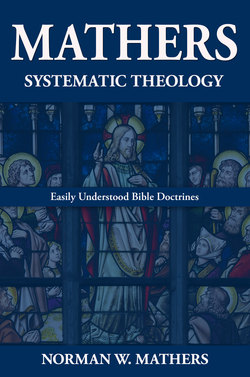Читать книгу Mathers Systematic Theology - Norman W. Mathers - Страница 8
1.1.6 Theological commentary is necessary to further analyze and explain natural or general revelation.
ОглавлениеChafer (1971:1:48-60) confirms God’s revelation of Himself by means of nature (Gen. 3:18-19; Ps. 19:1-6; Rom. 1:19-23; Rom. 8:19-21). Chafer adds a number of other revelations that are considered by some as fitting under special or supernatural revelation. Chafer continues by arguing that God has revealed himself through his providential hand (Deut. 30:1-10, Dan. 2:31-45, 7:1-28; Hosea 3:4-5). God the eternal Son has been revealed through the preservation of creation. Christ called all things into existence and sustains them by His own power (Col. 1:16; Heb. 1:10; Heb. 11:3; Col. 1:17). Thirdly, God has revealed Himself through miracles to man. These miracles (signs) proved Christ’s words and His offer of the kingdom as the true Messiah. Finally, God has revealed Himself through communication with man via theophanies, visions, and dreams (Gen. 3:8; Num. 12:8; Deut. 34:10) (ibid: 1971:1:53-60). Harold Lindsell in his book The Battle for the Bible categorizes these proofs beginning with God’s providential dealings as belonging to special or supernatural revelation (1976:29-30).
Charles Hodge, the Princeton scholar, confirms that revelation is the communication of knowledge (1975:1:156). He argues that general or natural revelation testifies to God’s presence by the witness of creation. He cites Psalm 19:1-4, Psalm 94:8-10, Acts 14:15-17, 17:24-29 and Romans 1:19-21 (Hodge 1975:1:24-25). Shedd (1979:1:62) defines revelation to be one of two categories. The first is general revelation. This is revelation that can be seen by the witness of creation. It is not written but is verified by special or supernatural revelation (the Bible). Special revelation will be dealt with later in this chapter. Shedd in his Dogmatic Theology defines general revelation as truth which man can perceive and process by reason (ibid:1:62). This knowledge has been available to man from the beginning of creation. If this were not true then God would be unjust. How could God declare men without excuse that spurn general revelation (Rom. 1:20)? Leitch (1975:1-2 in Henry (ed.) 1975) argues that both psalmist and apostle validate the fact that God can be known through his works. The knowledge is God which has been manifest within man (Rom 1:19). Man has suppressed this knowledge (Rom. 1:19, 21). The exegesis of the text is clear: “because the knowledge of God is manifest within them” (Rom. 1:19) [author’s translation] (Alan & Black 1968:531). Man refusing to acknowledge God’s testimony to his eternal power and God head, confirmed by His creation, are without excuse (Rom. 1:20). God can send the one who spurns this truth to Hell and still be just. It may seem harsh but this is what an accurate exegesis of the result clause of Romans 1:19 states. The apostle Paul uses man’s infidelity to the truth of God’s witness to Himself via creation to establish the guilt of the Gentiles in Romans 1:18-32.
Shedd concurs that natural revelation is inadequate for man to be saved (1979:1:66-67). Paul’s revelation of natural or general revelation in Romans 1 points out the fact that creation is the witness of God to man of his presence via creation. The certainty of the witness of God to His existence via creation to man is proven by Romans 1:19. Men are said to be without excuse. The question of whether man will be given further revelation (special) concerning the saving grace of God in Jesus Christ alone is dependent on man’s response to natural revelation. Charles Hodge points to the certainty of the universal knowledge of God based on scripture (Rom. 1:19-21) (1975:1:195). His point is that the heathen have the knowledge of God so that they are rendered inexcusable regardless of their infidelity and immorality (ibid: 195).
In evaluation, creation testifies to the knowledge of God as the creator of the world. Known (Rom. 1:19-21) means that creation testifies to God’s eternal power and deity. Man can not be saved by general or natural revelation but it determines whether he will receive additional light (special or supernatural revelation of salvation only through Jesus Christ).
